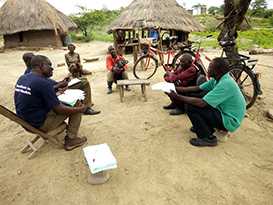Field Epidemiology Training Program: Partners & Networks
Partnerships

Zambia FETP resident Dr. Fred Kapaya administers a questionnaire to a family in Siavonga District to learn about their experiences with malaria (January, 2017).
Our work is only possible through partnerships. Developing partnerships is an important part of establishing, supporting, and sustaining our programs. Ministries of health are our main partners in building a strong global workforce of disease detectives.
Because of CDC’s extensive global health footprint, we also work alongside CDC’s other global health programs. In fact, many CDC-supported FETPs have developed and flourished as a collaboration between other CDC units, especially Global HIV/AIDS and TB, Global Immunization, and the Global Disease Detection Program. When requested by countries, usually after large outbreaks are reported, support is also provided by experts from CDC’s headquarters through the Global Disease Detection Operation Center and other deployment mechanisms.
Externally, we have built strong partnerships with many national and international organizations such as the World Health Organization, the U.S. Agency for International Development, the Department of State’s Biological Engagement Program, the Department of Defense’s Defense Threat Reduction Agency, the United Kingdom’s Ministry of Defense, the Carter Center, and the World Bank.
FETP Networks

Many of the countries who host or send residents to a neighboring country’s FETP collaborate with the Training Programs in Epidemiology and Public Health Interventions Network (TEPHINET), a global network of Field Epidemiology Training Programs, to share resources and best practices. Networks like TEPHINET exist in several WHO regions.
Around the World with FETP Networks
CDC works with FETP to support cooperative agreements with the following regional Networks:

African Field Epidemiology Training Network (AFENET) serves public health training institutions in Africa. Started in 1994, AFENET works closely with ministries of health in member countries to develop sustainable programs and capacity to strengthen field epidemiology and ensure healthier lives for Africans.

Eastern Mediterranean Public Health Network (EMPHNET) works to strengthen public health systems through a focus on applied epidemiology. Started in 2009, it is the only public health network in the Eastern Mediterranean region and is a collaborative effort with ministries of health.

South Asia Field Epidemiology and Technology Network (SAFETYNET) fosters collaboration and cooperation among countries in the Asia Pacific region. It started in 2009 to support applied epidemiology programs to enhance surveillance systems.

The European Programme for Intervention Epidemiology Training (EPIET) creates a network of highly trained field epidemiologists in the European Union, thereby strengthening the public health epidemiology workforce at member state and regional levels. Created in 1995, EPIET was integrated in the core activities of European CDC (ECDC) in 2006. The Public Health Microbiology Training path (EUPHEM) was initiated by ECDC in 2008 to provide training and practical experience in public health microbiology.

REDSUR (the network of Central and South American FETPs) provides a platform for cooperation and coordination across FETPs in Central and South America with the mission of strengthening field epidemiology programs in the region through capacity building and community service with ministries of health. Member countries are Argentina, Belize, Brazil, Colombia, Costa Rica, Haiti, El Salvador, Guatemala, Honduras, Mexico, Panama, Paraguay, Peru and the Dominican Republic.
- Page last reviewed: May 12, 2017
- Page last updated: May 12, 2017
- Content source:


 ShareCompartir
ShareCompartir